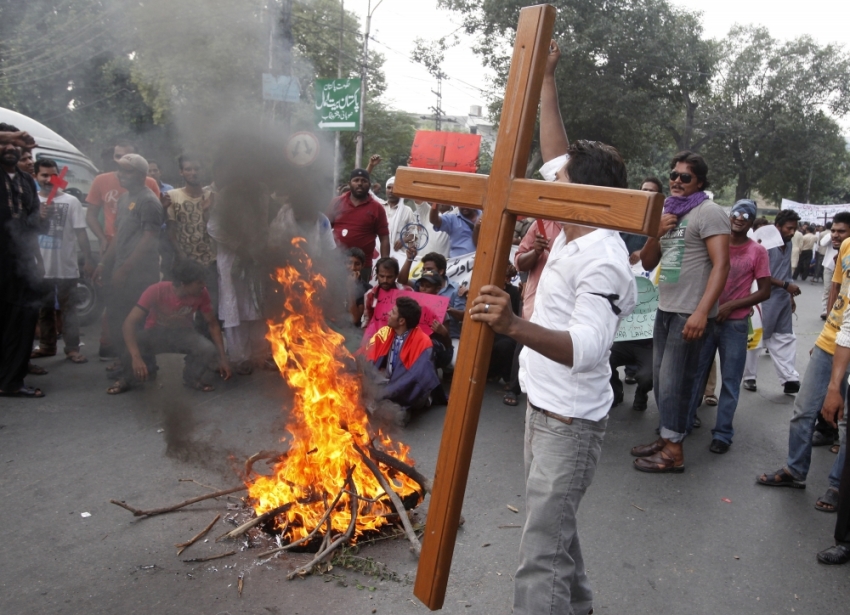Over 1,000 Pakistani Christians Protest Amendment to Deny Voting Rights to Religious Minorities

More than a thousand Pakistani Christians and church leaders in Lahore gathered outside of Punjab's legislative assembly on Wednesday to demand that the province's legislature throw out a proposed amendment that they beleive is designed to strip voting rights from religious minorities, women and workers in local elections.
According to UCA News, the proposed amendment would alter the electoral system so that women, religious minorities, and workers would not be able to vote for their representatives in their municipal councils.
Instead of voting for their own representatives who are legally allotted to their respective social classes, the amendment would give council members from the majority party the right to select the council's two female members, a non-Muslim member and representatives for workers and youth.
Elections for Punjab local officials are scheduled for Oct. 30, and the proposed amendment has drawn the concern of international human rights groups such as the U.S.-based International Christian Concern and the British Pakistani Christian Association, which warn that representatives who are selected, not elected, will do what's best for their own political party rather than act in the interests of the people they are appointed to represent.
"Selected members are disempowering," BPCA Chairman Wilson Chowdhry said in a statement issued to The Christian Post. "Without the backing of the electorate, they are forced to toe party lines and limply represent local people. Members who have the mandate of local people garner their authority as a tool for change, which is exactly what the vulnerable need."
Church leaders have protested against the amendment for months, according to UCA News. During Wednesday's protest outside the assembly, Catholic and Protestant bishops shouted chants of "minorities murderers" and "shame, shame!" from the top of a mounted truck.
"Do not take us hostage," Sebastian Shaw, Archbishop of Lahore, asserted in his address from the truck. "I address all assembly members — change your tactics. No more selection. This is neither a political nor a religious issue, but a question of our identity as Pakistani citizens."
Bishop Samuel Azariah, moderator of the Church of Pakistan, warned that there will never be unity in Pakistan when persecution against minorities continues to be accepted practice.
"As long as the minorities continue to suffer, there will be no progress or peace in the country," Azariah said. "How can you run a country if you can't protect the weaker minorities?"
After Wednesday's protest, church leaders met with the speaker of the Punjab assembly, Mohammed Iqbal, and Punjab's law minister, Rana Sanaullah. Archbishop Shaw, retired bishop Munawar Rumal Shaw from Peshawar, a representative from the Salvation Army of Pakistan, three priests and two ministers participated in the meeting to discuss their concerns about the amendment.
Samson Salamat, director of the Center for Human Rights Education who also filed a petition against the bill, organized a church press conference to discuss the meeting.
"The church leadership stood firm on their standpoint and demanded the withdrawal of the bill. They threatened to continue the protest in Punjab and all over the country if it was not withdrawn," Salamat said. "It seems our cries have finally reached them. Now we are asked to draft our concerns and hand it over to the government. Even after the passage of the ordinance, we are hopeful to strike down it."
Although an earlier Pakistan Supreme Court decision ruled that representatives for reserved minority seats at the national level are to be selected through a secret balloting process, Chowdhry reiterated that if the Punjab bill is enacted into law, it could have a devastating effect of the rights of minorities in Pakistan's biggest province.
"Christians in Pakistan are persecuted and women are completely disenfranchised. This bill, if allowed to pass, will enable elected politicians to exert their whims on vulnerable groups, retain the status quo or worsen existing social factors," Chowdhry stated. "I am reminded by a report about a decision made by the extremist politicians in Khyber Pakhtunkwa, who now operate Non-Muslim applicants for local government sweeper roles. If unchecked, the situation in Punjab, which has the largest population of all Pakistan's provinces, will mirror this."



























